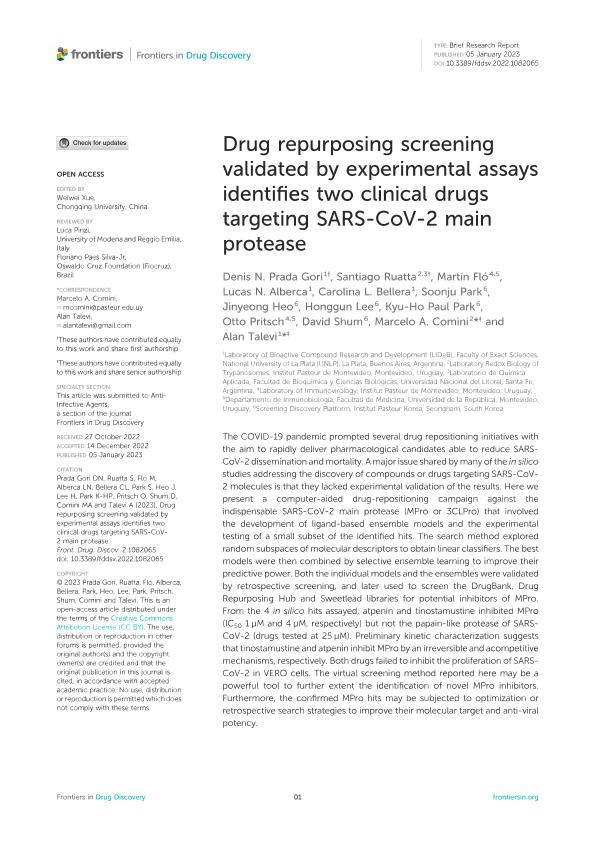Mostrar el registro sencillo del ítem
dc.contributor.author
Prada Gori, Denis Nihuel

dc.contributor.author
Ruatta Merke, Santiago Matías

dc.contributor.author
Fló, Martín
dc.contributor.author
Alberca, Lucas Nicolás

dc.contributor.author
Bellera, Carolina Leticia

dc.contributor.author
Park, Soonju
dc.contributor.author
Heo, Jinyeong
dc.contributor.author
Lee, Honggun
dc.contributor.author
Park, Kyu Ho Paul
dc.contributor.author
Otto Pritsch
dc.contributor.author
Shum, David
dc.contributor.author
Comini, Marcelo A.
dc.contributor.author
Talevi, Alan

dc.date.available
2023-12-05T14:43:06Z
dc.date.issued
2023-01
dc.identifier.citation
Prada Gori, Denis Nihuel; Ruatta Merke, Santiago Matías; Fló, Martín; Alberca, Lucas Nicolás; Bellera, Carolina Leticia; et al.; Drug repurposing screening validated by experimental assays identifies two clinical drugs targeting SARS-CoV-2 main protease; Frontiers Media; Frontiers in Drug Discovery; 2; 1-2023; 1-13
dc.identifier.issn
2674-0338
dc.identifier.uri
http://hdl.handle.net/11336/219320
dc.description.abstract
The COVID-19 pandemic prompted several drug repositioning initiatives with the aim to rapidly deliver pharmacological candidates able to reduce SARS-CoV-2 dissemination and mortality. A major issue shared by many of the in silico studies addressing the discovery of compounds or drugs targeting SARS-CoV-2 molecules is that they lacked experimental validation of the results. Here we present a computer-aided drug-repositioning campaign against the indispensable SARS-CoV-2 main protease (MPro or 3CLPro) that involved the development of ligand-based ensemble models and the experimental testing of a small subset of the identified hits. The search method explored random subspaces of molecular descriptors to obtain linear classifiers. The best models were then combined by selective ensemble learning to improve their predictive power. Both the individual models and the ensembles were validated by retrospective screening, and later used to screen the DrugBank, Drug Repurposing Hub and Sweetlead libraries for potential inhibitors of MPro. From the 4 in silico hits assayed, atpenin and tinostamustine inhibited MPro (IC50 1 µM and 4 μM, respectively) but not the papain-like protease of SARS-CoV-2 (drugs tested at 25 μM). Preliminary kinetic characterization suggests that tinostamustine and atpenin inhibit MPro by an irreversible and acompetitive mechanisms, respectively. Both drugs failed to inhibit the proliferation of SARS-CoV-2 in VERO cells. The virtual screening method reported here may be a powerful tool to further extent the identification of novel MPro inhibitors. Furthermore, the confirmed MPro hits may be subjected to optimization or retrospective search strategies to improve their molecular target and anti-viral potency.
dc.format
application/pdf
dc.language.iso
eng
dc.publisher
Frontiers Media

dc.rights
info:eu-repo/semantics/openAccess
dc.rights.uri
https://creativecommons.org/licenses/by-nc-sa/2.5/ar/
dc.subject
ATPENIN
dc.subject
TINOSTAMUTINE
dc.subject
IN SILICO SCREENING
dc.subject
CYSTEINE PROTEASES
dc.subject
COVID-19
dc.subject
DRUG REPOSITIONING
dc.subject
SARS-COV-2
dc.subject.classification
Otras Ciencias Químicas

dc.subject.classification
Ciencias Químicas

dc.subject.classification
CIENCIAS NATURALES Y EXACTAS

dc.title
Drug repurposing screening validated by experimental assays identifies two clinical drugs targeting SARS-CoV-2 main protease
dc.type
info:eu-repo/semantics/article
dc.type
info:ar-repo/semantics/artículo
dc.type
info:eu-repo/semantics/publishedVersion
dc.date.updated
2023-12-04T11:37:29Z
dc.journal.volume
2
dc.journal.pagination
1-13
dc.journal.pais
Suiza

dc.description.fil
Fil: Prada Gori, Denis Nihuel. Universidad Nacional de La Plata. Facultad de Ciencas Exactas. Laboratorio de Investigación y Desarrollo de Bioactivos; Argentina. Consejo Nacional de Investigaciones Científicas y Técnicas; Argentina
dc.description.fil
Fil: Ruatta Merke, Santiago Matías. Laboratorio de Biologia Redox de Tripanosomas ; Instituto Pasteur de Montevideo;
dc.description.fil
Fil: Fló, Martín. Universidad de la Republica. Facultad de Medicina; Uruguay
dc.description.fil
Fil: Alberca, Lucas Nicolás. Consejo Nacional de Investigaciones Científicas y Técnicas; Argentina. Universidad Nacional de La Plata. Facultad de Ciencas Exactas. Laboratorio de Investigación y Desarrollo de Bioactivos; Argentina
dc.description.fil
Fil: Bellera, Carolina Leticia. Universidad Nacional de La Plata. Facultad de Ciencas Exactas. Laboratorio de Investigación y Desarrollo de Bioactivos; Argentina. Consejo Nacional de Investigaciones Científicas y Técnicas; Argentina
dc.description.fil
Fil: Park, Soonju. No especifíca;
dc.description.fil
Fil: Heo, Jinyeong. No especifíca;
dc.description.fil
Fil: Lee, Honggun. No especifíca;
dc.description.fil
Fil: Park, Kyu Ho Paul. No especifíca;
dc.description.fil
Fil: Otto Pritsch. Universidad de la Republica. Facultad de Medicina; Uruguay
dc.description.fil
Fil: Shum, David. No especifíca;
dc.description.fil
Fil: Comini, Marcelo A.. Laboratorio de Biologia Redox de Tripanosomas ; Instituto Pasteur de Montevideo;
dc.description.fil
Fil: Talevi, Alan. Universidad Nacional de La Plata. Facultad de Ciencas Exactas. Laboratorio de Investigación y Desarrollo de Bioactivos; Argentina. Consejo Nacional de Investigaciones Científicas y Técnicas; Argentina
dc.journal.title
Frontiers in Drug Discovery
dc.relation.alternativeid
info:eu-repo/semantics/altIdentifier/url/https://www.frontiersin.org/articles/10.3389/fddsv.2022.1082065/full
dc.relation.alternativeid
info:eu-repo/semantics/altIdentifier/doi/http://dx.doi.org/10.3389/fddsv.2022.1082065
Archivos asociados
